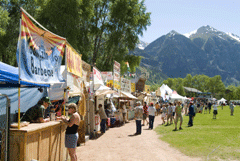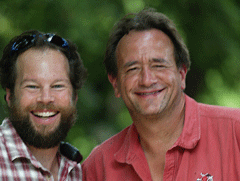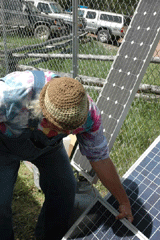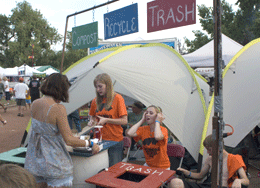Bluegrass Plays a Greener Tune
Air Date: Week of June 13, 2008

Festival coordinators require that all the garbage produced at the festival be composted or recycled. (Photo: Benko Photographics)
The 35th annual Telluride Bluegrass Music Festival will be greener than ever this year. Planet Bluegrass vice president Steve Szymanski tells host Bruce Gellerman about plans for carbon offsets, reusable water bottles, and the campsite challenge to encourage sustainable camping.
Transcript
[MUSIC: Telluride Festival: Ricky Skaggs “Get Up John” from Choice Picks 10th Anniversary Ibma Awards (Sugar Hill Records 1999)]
GELLERMAN: This year it’s going all green. The Telluride Bluegrass Festival will be 100 percent carbon neutral. All its carbon dioxide emission will be offset by clean energy technologies. It’s part of a trend - the Montreal International Jazz Festival, the Sasquatch music festival in Washington, and the Bannaroo music festival in Tennessee are also members of the carbon neutral choir.
At Telluride, Colorado 10,000 festivarians as they’re called, will gather in a canyon surrounded by the San Juan Mountains. And for four days around the summer solstice they’ll cook, camp and of course listen to live music in a carbon clean environment.
[MUSIC: Telluride Festival: Ricky Skaggs “Get Up John” from Choice Picks 10th Anniversary Ibma Awards (Sugar Hill Records 1999)]
GELLERMAN: Steve Szymanski is vice president of Planet Blue Grass, which produces the Telluride Festival. Mr. Szymanski, welcome to Living on Earth.
SYZMANSKI: Thank you very much and please call me Steve.
GELLERMAN: Okay Steve, thanks. Boy, this bluegrass festival: very ambitious. Carbon neutral?

Steve Szymanski & Craig Ferguson of Planet Bluegrass. (Photo: Laura Klein)
GELLERMAN: And I guess the large majority of the carbon is coming from exactly that, people getting to Telluride.
SYZMANSKI: It really is and that was one of the things we realized in pretty short order, well over 90 percent of all the emissions created were from travel. It’s exacerbated by the fact that Telluride is in the middle of nowhere if there’s still such a place in the country.
GELLERMAN: How do you hope to make all that travel carbon neutral?
SYZMANSKI: Well, first with uh, looking at efficiencies, and we have a pretty aggressive carpooling program and then obviously there’s going to be a certain number of cars that just have to make the drive so what we’ve been doing more the last couple years is offsetting with projects that are going on around the country now in landfills. So we’re working with a huge landfill in Illinois with 195 acres to sequester all the methane from that landfill. The methane actually is used then used to create energy for the community and this is basically done with the help of folks like us and other people who are out there looking to put their money into these projects.
GELLERMAN: So Steve how much carbon are you hoping to offset?
SYZMANSKI: Well this year that number comes in to right around 5.7 million pounds of carbon. That is equal to taking 500 cars off the road forever.

“Festivarians” bring solar panels to power their campsites while at the festival. Two hydropower stations are also available to campers. (Photo: Benko Photographics)
[LAUGHTER]
SYZMANSKI: Well you know again take water for instance. It’s kind of evolved over the years but in 2004 we were working with a local business down there that developed the first corn plastic water bottle in the world. Part of the thing is we’ve really been mandating at the festival now is everything in the festival grounds must be recyclable or compostable. And so having this you know compostable bottle was you know were touting it off, “look at us, we’re cool, we have the ability to throw this in our compost pile.”
We’ve come to realize through lots of reading and you know other dialogues we’ve had that bottles no matter what you’re doing you still have a waste stream, you still have to drive it somewhere, you still have that carbon footprint, so why not get rid of the bottles entirely. That’s kind of one of our new initiatives this year is to really go back to drinking local water so we’re pretty excited that we’re going to have a wonderful, free filtered water station for all our audience and they can bring a reusable bottle and let’s not have any plastic at the festival.
GELLERMAN: People can bring tin cups like they used to use back in the old days of silver mining.
SYZMANSKI: You know it’s funny we’re going right back to that the stainless steel mug, we have a kleen canteen product, all our artists are going to get a nice calligraphied kleen canteen with their name on it and from the stage they’re going to be sending the same message that our audience is sending.

Festival coordinators require that all the garbage produced at the festival must be compostable or recyclable. (Photo: Benko Photographics)
SYZMANSKI: We have a whole backstage catering for our artists and families and guests of approximately a 1,000 meals a day. One of the initiatives back there in the last couple years was really looking at the food footprint. You know the organics were definitely high on the list but what we realized is really local food, sourcing local food, is just as important if not more important than sourcing organic food. And happy to say that even in June in Telluride we’re able to get all of our dairy from Colorado, we’re able to get chicken from Colorado, we’re 75 percent now all organic menu for our backstage. And we’d love to see the vendors out front do that but you know we want to be able to prove to ourselves that yes we can go organic, we can source local and then once we’ve, we feel like we’re doing that and it’s possible then we’ll ask our vendors to do that as well.
GELLERMAN: You just got some real headliners: Ani DiFranco, Arlo Guthrie of course. One of the bands I’ve never heard of, I must admit, is Leftover Salmon.
SYZMANSKI: Well they came right out of the camp ground in Town Park in Telluride back in the late eighties and nineties and that is really a Colorado jam band. Everyone’s really looking forward to that because that’s a good, good raucous late night set, keep everybody dancing and keep everybody warm.
[MUSIC: Leftover Salmon: “Bend In The River” from Ask The Fish (Bert Records 2004)]
GELLERMAN: I understand that this is actually the second year that you have something called the “Campsite Challenge.” How green is your campsite?
SYZMANSKI: Well what we ask people to do is just to think about what they’re bringing to the event and making sure that everything they bring has a useful purpose but then also gets brought back out of the event and then think about ways you can generate electricity. We actually have two hydro stations set up on the river for campers who want to use you know want to grind their espresso beans. We have lots of solar panels coming into the festival grounds: there’s just a lot of ingenuity in these camp grounds and so we want to begin incentivize that behavior but also we want to honor these people that are really going all out.

Festival coordinators are hoping to get vendors to buy organic and locally grown foods for future festivals. (Photo: Benko Photographics)
SYZMANSKI: You know I do, but I really think our venues out here in Colorado really just speak to the beauty and the pristine nature of Telluride. Folks immediately get it—I think its wired in that this is a beautiful place, we need to keep this place beautiful, and we need to preserve it. And so we’re lucky enough I think to have nature in everyone’s face all the time and so I think it’s been a little easier messaging around that because it’s just so obvious that this kind of environment is only possible if we take care of our event.
GELLERMAN: Have any of your performers come up with a carbon neutral song for the show?
SYZMANSKI: The Barenaked Ladies made up a song, like they frequently do, a couple years ago and they actually threw in some fun comments about the greening of the event but that was as close as we got.
GELLERMAN: Well Steve thank you very much I really appreciate it. Have a great time at this year’s festival.
SYZMANSKI: We certainly will. Thank you very much.
GELLERMAN: Steve Szymanski is vice president of Planet Blue Grass, which produces the Telluride Bluegrass Festival.
Links
Living on Earth wants to hear from you!
Living on Earth
62 Calef Highway, Suite 212
Lee, NH 03861
Telephone: 617-287-4121
E-mail: comments@loe.org
Newsletter [Click here]
Donate to Living on Earth!
Living on Earth is an independent media program and relies entirely on contributions from listeners and institutions supporting public service. Please donate now to preserve an independent environmental voice.
NewsletterLiving on Earth offers a weekly delivery of the show's rundown to your mailbox. Sign up for our newsletter today!
 Sailors For The Sea: Be the change you want to sea.
Sailors For The Sea: Be the change you want to sea.
 The Grantham Foundation for the Protection of the Environment: Committed to protecting and improving the health of the global environment.
The Grantham Foundation for the Protection of the Environment: Committed to protecting and improving the health of the global environment.
 Contribute to Living on Earth and receive, as our gift to you, an archival print of one of Mark Seth Lender's extraordinary wildlife photographs. Follow the link to see Mark's current collection of photographs.
Contribute to Living on Earth and receive, as our gift to you, an archival print of one of Mark Seth Lender's extraordinary wildlife photographs. Follow the link to see Mark's current collection of photographs.
 Buy a signed copy of Mark Seth Lender's book Smeagull the Seagull & support Living on Earth
Buy a signed copy of Mark Seth Lender's book Smeagull the Seagull & support Living on Earth

